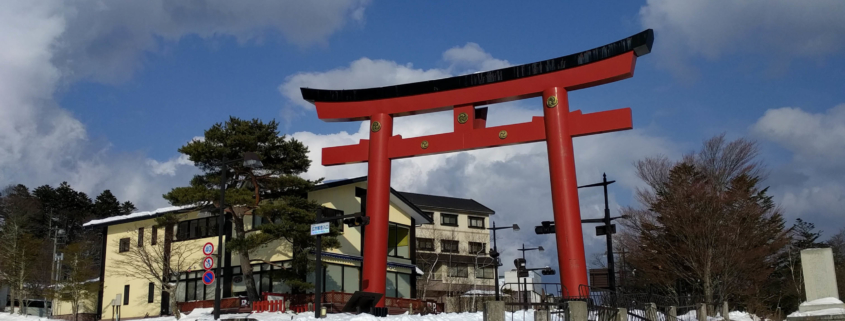Rain Clouds and Cherry Trees
The crowd presses around me. Hands reach up and out. Sticks hover above the fray, plastic extensions of their owners’ arms. Snap. Click. Ding. Shutter. A group of three women in front of me stop short to pose for the camera and a man collides into my back. He murmurs what I think is an apology, and holds his hands up to gesture innocence. Despite the language barrier, we understand that these things cannot be helped when so many people are packed into a small space.
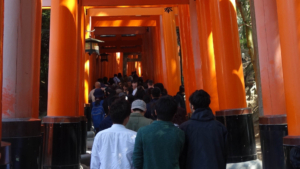
Photo Credit: Vicki Miller
I’m traveling across Japan with my partner Christian, taking needed time off from the challenges I’m facing at work and struggles with my writing. But mostly I’m here to see the cherry blossoms. It’s a trip I’ve been dreaming about since I studied Japanese literature as an undergrad. It looks like everyone else had the same idea. Christian and I are two among thousands of people streaming through Fushimi Inari, a shrine on the outskirts of Kyoto. The crowd moves through the narrow paths framed by thousands of vermilion torii. A torii is a traditional Japanese gate, often found at Shinto shrines. They symbolically mark the transition from the sacred to the profane, and I can’t help but think the throng is itself like profanity in this place reserved for prayers. It is noisy and we are packed shoulder to shoulder; I have to push and shove to ascend the mountain, unable to set my own pace. I’d seen the stunning photographs on travel websites and Instagram accounts, but pictures always depicted an empty corridor of vibrant reds and blacks, shrouded in quiet, contemplative reverence. I haven’t found that place. Instead I’m greeted by a mob. I am stressed; I am hurried; and I am claustrophobic.
The next day we visit Kinkaku-ji, the Golden Pavilion, and face another crucible of shoulders and elbows. The tourists here push into every open space, angling for a perfect picture. Everyone wants the shot of this temple, with its glittering gold-leaf exterior and serene lake, but none of us want the others, our fellow travelers, inside the borders of our memories. It wouldn’t be a good narrative to tell our friends back home. It wouldn’t match the story sold to us on travel blogs. There’s nothing enchanting or awe-inspiring about a tumultuous churn of people. The image on my small camera screen is a lie; that calm meditative place does not exist.
Frustration and disappointment are two emotions I’d hoped to leave behind on this trip. They’ve been plaguing me the last few months, ever since I began the final semester of my MFA program. When I applied to Antioch two years ago, I had just one goal for myself: to finish writing my novel. Despite years of effort, with a full-time job and plenty of other distractions, I’d only managed to produce 15,000 words. External deadlines are a strong motivator, and I hoped that the program would provide me the structure I needed to finally get serious about the endeavor. By graduation, I expected to have an agent-ready manuscript. But that hasn’t happened, and the weight of this failure grows each day as graduation nears.
* * *
My feet ache when we arrive at the ryokan, a traditional Japanese inn. On the recommendation of friends, I reserved one night on the trip to be pampered, relaxing in open-air mineral baths, sleeping on traditional futons, and most importantly, dining in tatami mat rooms. I’ve been told the kaiseki dinners served at ryokans are some of the best meals you can find in Japan. Shortly after we are settle into our room, our host, Kaneko-san, enters and warmly greets us with our dinner. She places a few dishes on the table: a small sampling of sushi, a personal grill with a few slices of raw beef, a bowl of marinated tofu and a plate dotted with pinches of various pickles. The presentation is meticulous, but it’s more of a snack then a meal, and it’s nothing like the multi-course feast my friends had described. They raved about the unique dishes and the one-of-a-kind experience, but there’s nothing in front of me I haven’t had before at a Japanese restaurant back home in Los Angeles.
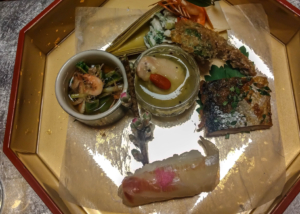
Photo Credit: Vicki Miller
We eat in silence. It’s good, I say, trying to stay positive. The beef is remarkably tender, with a sweet and salty marinade that leaves me craving more. But we stare at our empty plates and our stomachs gurgle in the silence. The food is fresh and high quality, but I wonder if a different ryokan would have served the unforgettable meal I expected, rather than this average one. Perhaps I made the wrong choice.
* * *
During my first Antioch residency, I attended a seminar discussing the common errors made by beginning writers. As the lecturer went down the list, I recognized that I had committed each and every one in my budding novel—I relied on false suspense, I dramatized routines, I used framing devices that didn’t progress the story. I panicked and cast aside my previous work as worthless, then convinced myself to start a new book from scratch. My first project period was spent outlining, then re-outlining a brand new plot. I wrote character profiles and a few chapters. Then I threw them out and re-wrote them. I didn’t know how to move forward, and in my second residency, I shifted focus again. Learning to edit and refine my writing would be a helpful skill to have, I reasoned, so I began writing and revising short stories. I even hoped to get one published. But despite submitting to dozens of journals, I’ve only received rejections. I thought two years would be enough, but it hasn’t been. I have no published fiction, and no completed novel.
* * *
As we wait for our dishes to be cleared, I think about the wrong turns I’ve taken in my writing, and the wrong choices I’ve made on this trip. I wanted it to be perfect, but the cherry blossoms are not blooming, and thanks to colder than average temperatures the prior week, most of the buds will remain stubbornly closed until our departure. Everything is over-booked and over-crowded. Tears hide behind my smile. When Christian asks what’s wrong, I tell him I’m tired. Disappointment wraps thorny vines around my arms and chest and my thoughts wilt.
“No rain clouds,” he says to me, waving his hand back and forth above my head. I laugh at the comparison to a depressed Charlie Brown, but it doesn’t cheer me up.
When Kaneko-san returns, I’m surprised to see her carrying another full tray of food. She places grilled salmon and various mountain vegetables in front of us. These dishes are salty and sour. I taste the ocean waves lapping against my gums. Kaneko-san returns a third, then fourth, then fifth time. With each new course, the meal delves further into the fascinating journey for my taste buds, and the threads of my disappointment unwind and melt away.
By dessert and tea, we are smiling and laughing, and I’m so stuffed I can barely walk. We rave about our favorite dishes and I realize that mine had been served at the start: a sweet pickled plum, the size of a large gumball, with neon green flesh that dissolved on my tongue. Expectations are the stories we tell ourselves; they are a narrative of what we want our world to be, but too often they blind us to reality. Initial disappointment with the meal had prevented me from fully savoring the moment.
* * *
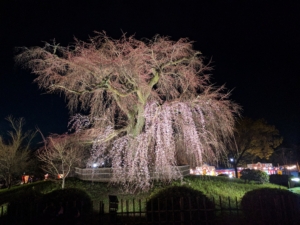
Photo Credit: Vicki Miller
Sakura—cherry blossoms—have been culturally significant in Japan for hundreds of years. Festivals are planned with live music, activities and food, and people of all ages escape outside for hanami (literally translated as flower viewing). They fill the parks, claiming space beneath the trees, drinking, eating, relaxing, and enjoying the moment. The short lifespan of the bloom is a metaphor for the impermanence of life. Watching the cherry blossoms means recognizing ephemeral beauty, made poignant by the loss that inevitably follows. To partake in hanami is to write a story in present tense.
I can’t change the fact that Japan is swamped with tourists, but I can write a new narrative for myself. That evening, the hot spring waters ease my tired muscles, and my stress evaporates into the starry sky. Instead of dwelling on how my trip could have been better, I resolve to focus on enjoying each moment. My expectations melt away, and I let the story unfold.
When we wake up early the next morning with jet-lag, we don’t force ourselves to sleep longer—we scoot out the door just as the sun rises. The air is chilly, and the tall, narrow buildings are crowded together in silence. Neon store signs sleep, like the people in the city. We wait nearly thirty minutes for our bus—it’s too early for regular service—but when we arrive at the bamboo forest, the path is tranquil and the stalks tower over us in near isolation. The morning sun glistens through a green canopy, the leaves becoming a thousand emeralds.
Each day we see as much as we can, as early as we can, and when it becomes too crowded we duck into stores or restaurants. That is how we find a woman selling fox prints on the backside of the mountain. I admire the design—hundreds of cute foxes crowded together—and she challenges me to find the one turned around backwards, like a hunt for Waldo. “I designed myself,” she tells me. I buy a print. Taking a train into the mountains, we are entranced watching fresh snow settle onto the pines and forest floor. Another day, we rest our feet in a cafe that serves the fluffiest pancakes I’ve ever tasted.
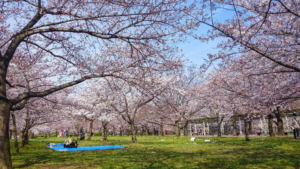
Photo Credit: Vicki Miller
We head to Osaka Castle our final day in Japan. The sight that greets us is unexpected: a field of cherry trees on the southern side of the park is in full bloom. We only have a few hours before our flight, but instead of rushing into the castle, we hold hands and stroll beneath the clouds of pale pink petals. An older gentleman sits peacefully along the river. A young couple spreads a blue tarp, staking out a spot for a picnic that is to come. This park wasn’t on one of the lists of the top sakura spots in Japan, yet this moment will stand out in our minds for years to come. It is perfect in its simplicity. As I learned in one of my seminars, the ending of a story should be unexpected, yet inevitable. Such are life’s most treasured gifts.
* * *
A few days ago I finished assembling my final manuscript: the first 110 pages of my novel-in-progress. The guidelines were to “collect, revise and reflect” on work written in the program. Sifting through my writing was difficult; I stumbled over awkward phrases. I deleted thickets of tangled words—slash and burn became my philosophy. Yet I was surprised to find that I had progressed more rapidly over the last two years than I expected. There was nothing slow and steady or incremental about my growth; each successive semester’s work could have been written by a different person.
In a few short weeks, I’ll stand in front of my family and friends and receive my diploma. I’ve swapped my rain clouds for pink petals. I know I’ve accomplished much more than writing a single book; I’ve built a community of friends, writers, and mentors, who will continue to support and encourage me long after my student loans have been paid. I know what it means to engage the community as an artist, and I’ve a found a voice for speaking out against injustice. This isn’t a story about falling short of goals and expectations, or a story about opportunities missed. As I reflected on and revised my final manuscript, I saw that the narrative I’d been writing the last two years was the story of becoming a writer.
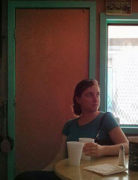 Vicki Miller is an MFA candidate at Antioch University Los Angeles. She spends her days producing video games for a major publisher and often finds herself juggling flame-engulfed-chainsaws and excel sheets. When she’s not slurping the best ramen in LA or proclaiming her hatred of olives, she finds time to work on her first novel. Find her on Twitter @tigrvix.
Vicki Miller is an MFA candidate at Antioch University Los Angeles. She spends her days producing video games for a major publisher and often finds herself juggling flame-engulfed-chainsaws and excel sheets. When she’s not slurping the best ramen in LA or proclaiming her hatred of olives, she finds time to work on her first novel. Find her on Twitter @tigrvix.

